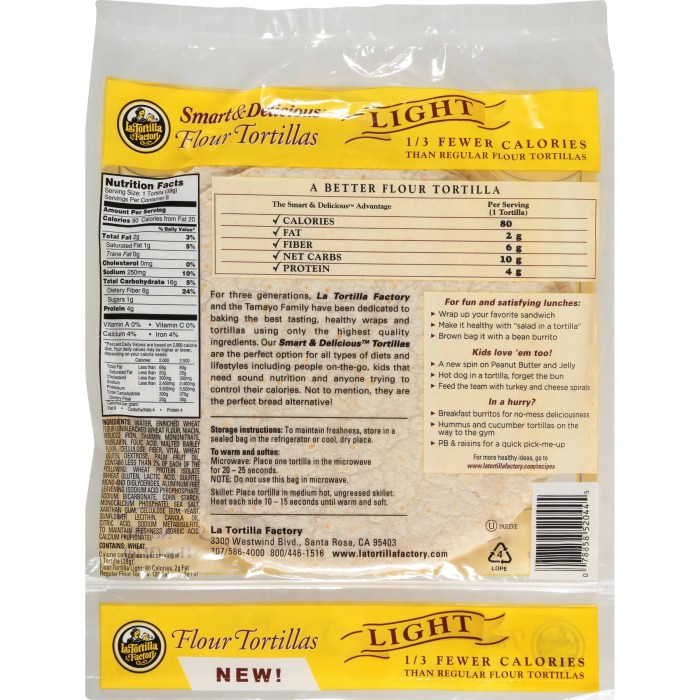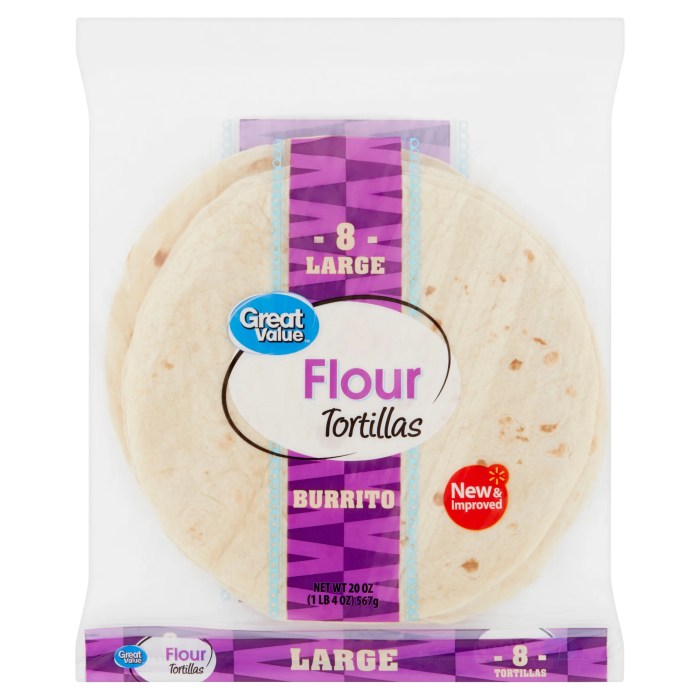Impact of Flour Tortilla Consumption on Health: Nutrition Facts For Flour Tortilla

Nutrition facts for flour tortilla – Flour tortillas, a staple in many cuisines, present a complex nutritional profile impacting health in various ways. Their contribution to overall well-being depends heavily on factors such as consumption frequency, portion size, and the presence of added ingredients like fats and sugars. Understanding these nuances is crucial for making informed dietary choices.
Blood Sugar Response to Flour Tortilla Consumption
Flour tortillas, primarily composed of refined wheat flour, have a relatively high glycemic index (GI). This means they can cause a rapid spike in blood sugar levels after consumption. The extent of this spike varies depending on factors such as the tortilla’s thickness, the presence of added sugars or fats, and the individual’s metabolic response. For individuals with diabetes or insulin resistance, consuming large quantities of flour tortillas can lead to blood sugar control challenges, potentially necessitating careful portion control and monitoring.
Conversely, individuals with healthy glucose metabolism may experience less pronounced effects. The glycemic load (GL), which considers both the GI and the amount of carbohydrates consumed, provides a more comprehensive picture of a food’s impact on blood sugar. A high-GL food, even if not extremely high-GI, can still significantly impact blood glucose.
Flour Tortillas and Weight Management
The role of flour tortillas in weight management is multifaceted. While they provide a source of carbohydrates for energy, their relatively low fiber content and high GI can contribute to increased calorie intake and weight gain if consumed excessively or as part of an overall unbalanced diet. Portion control is paramount; consuming several large flour tortillas in a single meal can easily exceed recommended daily carbohydrate intakes.
Furthermore, the tendency to pair flour tortillas with high-calorie fillings, such as cheese, meat, and sour cream, further exacerbates the potential for weight gain. Conversely, incorporating smaller, whole-wheat flour tortillas into a balanced diet that emphasizes fruits, vegetables, and lean proteins can be part of a healthy weight management strategy. For instance, a single small whole-wheat tortilla used as a base for a salad with lean protein could be a healthier choice compared to several large flour tortillas filled with high-fat ingredients.
So, you’re checking the nutrition facts for flour tortillas? Good for you, health-conscious burrito enthusiast! But let’s be honest, sometimes a little vino is needed to balance out all that wholesome goodness. If you’re curious about the nutritional profile of your Cabernet Sauvignon pairing, check out the details here: nutrition facts for cabernet sauvignon. Then, back to those tortillas – remember, moderation is key, even with delicious carbs!
Health Benefits and Drawbacks of Regular Flour Tortilla Intake
Regular consumption of flour tortillas presents both potential benefits and drawbacks. On the positive side, they offer a readily available and relatively inexpensive source of carbohydrates, providing energy for daily activities. However, their nutritional value is often limited, lacking significant amounts of fiber, vitamins, and minerals unless fortified. The potential drawbacks are more significant, particularly the high GI, leading to blood sugar fluctuations and potentially contributing to weight gain if consumed in excess.
The lack of fiber can also negatively impact digestive health and satiety, leading to increased hunger and potentially overeating. Moreover, the refined nature of the flour may contribute to inflammation in some individuals. Therefore, moderation and mindful consumption are key to mitigating potential negative health effects.
Glycemic Index Comparison with Other Bread Products, Nutrition facts for flour tortilla
The glycemic index of flour tortillas varies depending on their composition (e.g., whole wheat vs. refined wheat) and thickness. Generally, they rank higher on the GI scale compared to whole-grain breads, such as whole-wheat bread or rye bread. For example, a refined white flour tortilla might have a GI of 70 or higher, while a whole-wheat tortilla may have a slightly lower GI, perhaps in the 60s.
However, even whole-wheat tortillas are generally higher on the GI scale than many whole-grain breads. This difference in GI reflects the different processing methods and the presence of fiber, which slows down the rate of glucose absorption. This comparison highlights the importance of choosing whole-grain options whenever possible to minimize the impact on blood sugar levels.
Flour Tortilla Ingredients and Processing

Flour tortillas, a staple in many cuisines, undergo a relatively straightforward production process, yet the ingredients and methods employed significantly impact their nutritional profile and overall quality. Understanding these aspects is crucial for consumers seeking to make informed dietary choices.The primary ingredients in flour tortillas are flour (typically wheat flour), water, and salt. Variations exist, however, with some manufacturers adding shortening, leavening agents, and other additives to enhance texture, shelf life, and flavor.
The specific flour type, whether bleached or unbleached, whole wheat, or a blend, plays a considerable role in the final product’s nutritional content.
Flour Types and Their Nutritional Impact
The type of flour used dramatically alters the nutritional composition of the tortilla. Bleached flour, which has undergone a process to remove pigments and improve its baking properties, generally contains less fiber and micronutrients than unbleached flour. Unbleached flour retains more of its natural nutrients, offering a slightly higher concentration of fiber and certain vitamins and minerals. Whole wheat flour tortillas, containing the entire wheat kernel, boast significantly higher fiber content, along with increased amounts of vitamins, minerals, and antioxidants compared to their refined counterparts.
This difference in nutritional density is a key factor for consumers considering the health implications of tortilla consumption. For example, a whole wheat tortilla might provide double the fiber of a bleached flour tortilla of comparable size. This increased fiber content contributes to improved digestive health and satiety.
Tortilla Manufacturing Process and its Nutritional Consequences
The manufacturing process itself can influence the nutritional value of flour tortillas. The process generally involves mixing the ingredients, forming the dough, pressing it into thin rounds, and cooking them on a hot surface (either a griddle or conveyor belt). High-heat cooking can potentially lead to the loss of some heat-sensitive vitamins and nutrients. Additionally, the use of certain processing aids or additives, such as preservatives, can affect the overall nutritional profile.
For instance, the addition of emulsifiers might improve texture but could also negatively impact the tortilla’s digestibility for some individuals. Furthermore, the length of time tortillas spend in storage, before consumption, also impacts their freshness and nutrient retention.
Potential Additives in Commercially Produced Flour Tortillas
The following additives are commonly found in commercially produced flour tortillas:
- Shortening or oil: Added to improve texture and softness.
- Leavening agents (e.g., baking powder): Used to create a lighter texture.
- Preservatives: Extend shelf life and prevent spoilage.
- Emulsifiers: Enhance dough consistency and prevent separation of ingredients.
- Enzymes: Improve dough handling and processing.
- Dough conditioners: Enhance dough elasticity and strength.
While some of these additives are generally considered safe at typical levels, consumers should be aware of their presence and potential impact on health, especially for individuals with sensitivities or allergies. Checking ingredient lists carefully allows for informed choices.
Query Resolution
Are flour tortillas gluten-free?
No, traditional flour tortillas are made from wheat flour and therefore contain gluten.
Can I eat flour tortillas if I have diabetes?
Flour tortillas can be part of a diabetic diet, but portion control and choosing whole wheat options are crucial due to their carbohydrate content. Consult a dietitian or doctor for personalized advice.
How many calories are in a typical flour tortilla?
The calorie count varies depending on size and type, but a typical 6-inch flour tortilla contains approximately 70-100 calories.
Are there any preservatives in commercially produced flour tortillas?
Yes, many commercially produced flour tortillas contain preservatives like calcium propionate to extend shelf life. Check the ingredient list for specifics.
